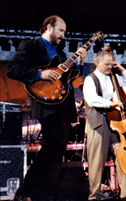|

photo: Carlo Pieroni
Comment
on this story
What:
John Scofield Band
When:
Thursday, June 14 at 9 p.m.
Where:
Blue Cats
Cost:
$15/$17.50. Tickets Unlimited Outlets or 656-4444.
|
|

To guitar wizard John Scofield, it's all jazz
by Mike Gibson
A stylist and a chameleon, a straight-ahead jazzbo and a fusion pioneer, guitarist John Scofield has fashioned his estimable resume treading the fine lines separating the disparate schools of thought that comprise jazz in the new millennium.
A jazz-rock luminary since the mid-'70s and a veteran of Miles Davis' latter-day fusion ensembles, Scofield in his solo excursions gives equal time to swing and post-bop jazz. His latest album, Works For Me on Verve Records, sees the graying 50-year-old guitarist offer a selection of original tunes delivered by a very traditional bop quintet; the effort is a nimble and sudden about-face from the funky four-on-the-floor jazz-rock stylings of his other recent Verve releases.
"I'm constantly going back and forth between what other people call 'different styles,'" says Scofield, speaking by phone from a hotel room somewhere in California's small-town hinterlands. "I'm always trying to learn to play tunes in bebop and swing—to swing and get better with that style. But I've also grown up playing jazz-rock in different ways, shapes and forms, in the mid-'70s with many bands, and even 10 years before that."
Having come of age in the '60s, arguably the heyday of daring, experimental, venturesome rock guitar ("I started out with Hendrix," says Sco; "I was in high school when all his records came out"), Scofield tempered his rock instincts with a considerable appreciation for jazz, especially the guitar wizardry of the great Wes Montgomery and Jim Hall, the venerable and soft-spoken swing sage who to this day remains Scofield's idol.
"Jazz music more than anything else has influenced my guitar playing," says Scofield. "Although there were a lot of blues guitar players who also shook me up: B.B. King, Albert King, Otis Rush—those guys really blew me away."
Scofield's early jazz inclinations eventually led him to the prestigious Berklee College of Music in Boston (beginning in his late teens), and then carried him through a series of high-profile gigs as a sideman, with the likes of fusion drummer Billy Cobham, trumpeter Chet Baker, and legendary stand-up bass virtuoso Charles Mingus. Although he began recording as a bandleader himself in the late '70s, it was his work with Miles Davis from 1982 to 1985 that truly brought the young guitarist into the larger consciousness of the jazz community.
"It was a great time for me, and I really enjoyed Miles because I was a huge fan of his music before I joined his band," Scofield says. "He was a player, a fountain of knowledge of jazz music. It was great to be around him, and I learned an awful lot about music—about being 'in the moment' when I'm playing, about the importance of spontaneity, the real great quality that can have. I was there for a jazz education, and he wanted to give it.
"But he was also a pop star, and it was wild sometimes," Scofield adds, remembering the more tumultuous aspects of his tenure with the enigmatic and notoriously irascible maestro. "He was...difficult, sometimes, a superstar kind of guy. He was definitely used to having his own way."
Since then, Scofield has evolved into an esteemed jazz statesman in his own right, a bandleader and stylist who has proven himself equally conversant with fusion, funk and straight-no-chaser-jazz, an exceptionally tasteful virtuoso who can seamlessly navigate styles and axes—jazz to fusion, hollow or solid-body electric to nylon-string acoustic guitar.
In many ways, Scofield's versatility is reflective of the fractal, disparate nature of jazz and improvisational music today. Having moved beyond the evolutions and bedrock mutations of bop and free improvisation and proto-fusion, jazz—as it is popularly understood—seems to have reached a crossroads of sorts, a realm wherein the boundaries between forms are irrevocably blurred, or perhaps even nonexistent.
"You read so much about people saying this and that," says Scofield. "There was a direct school of jazz, a tradition that went from one school to another for about 30 years. Then it got really diffuse, and that's where we are today.
"But I don't think about it more than that. That stuff gives lots of critics and intellectuals something to talk about, about where the music is going and that sort of thing. There was this movement, this jazz movement that went somewhere and got really dispersed. And now people are saying 'Wait a minute, I want it to be a bebop movement like it was, or a free-jazz movement like it was, so I can be part of it.' But maybe straight-ahead jazz has hit its peak, and now it has to go somewhere else. There's only so many times you can do the same thing."
As to his own direction, Scofield knows only that he will tour until August, at which point he will record another album, a return to the funky fusion jazz that had seized his attentions prior to Works For Me. What he can state unequivocally is that his searching, restless muse isn't likely to settle anytime soon.
"I don't know exactly what I'll be doing in six months, except that I'm going to be trying to get better," the veteran jazzer says with no feigned modesty. "I'm always looking to work, to write, to practice, to find other musicians I can play with and get something happening."

June 7, 2001 * Vol. 11, No. 23
© 2001 Metro Pulse
|





